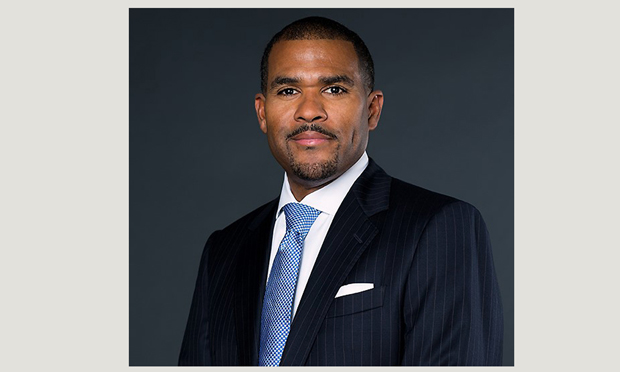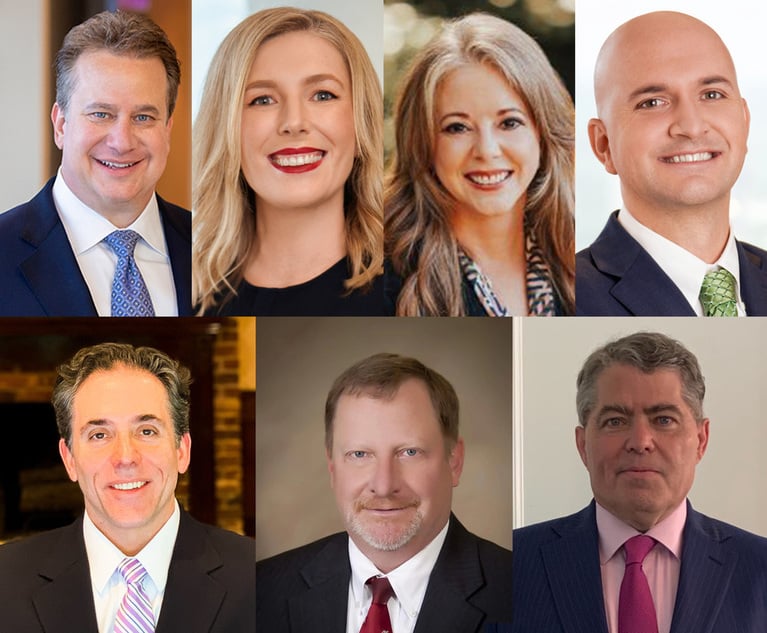Mandatory Malpractice Insurance Headed for Vote by Bar Study Committee
Only Oregon and Idaho require lawyers to carry professional liability insurance, while 23 states require lawyers to disclose whether they have insurance.
March 05, 2020 at 03:15 PM
4 minute read
 Christopher Twyman. (Courtesy photo)
Christopher Twyman. (Courtesy photo)
The State Bar of Georgia this month could take a step toward requiring lawyers to obtain legal malpractice insurance or disclose to the bar or the public whether they carry such coverage.
The bar's Professional Liability Insurance Committee is set to vote on four separate proposals March 27 after a public discussion, the fourth the panel has held since October. The 19-member committee will recommend the Board of Governors consider any of the four proposals that receives a majority vote at the meeting at Chateau Elan in Braselton.
Only Oregon and Idaho require lawyers to carry professional liability insurance, while 23 states require lawyers to disclose whether they have insurance, according to Paula Frederick, the Georgia bar general counsel.
Last year the bar's president, Judge Ken Hodges of the Court of Appeals, argued for mandatory insurance. "The public largely believes we have insurance coverage, and those who become victims of malpractice are usually in disbelief when they find out that their attorney was not insured," he wrote in the April 2019 Georgia Bar Journal.
Others have complained that mandatory insurance is "a solution looking for a problem," as one letter-writer told the Daily Report last year, concerned that the costs could drive some lawyers out of business.
Hodges said last year that a previous study committee found that insurance could be obtained for as low as $800 per year. The cost of his insurance when he was in private practice in 2018, he noted, was $3,500 per year for as much as $1 million in coverage.
Christopher Twyman, a Rome lawyer who chairs the Professional Liability panel, emphasized his group cannot make policy for the bar. He said the panel will urge the Board of Governors, which is holding its spring meeting at the resort the day after the vote, not to consider any recommendation until at least its summer meeting in June.
"My one goal as committee chair is to make this a deliberative process," Twyman added, who reported the bar has received 75 letters and emails on the issue in the past year. He noted most messages were either for or against mandatory insurance, "but not a lot of in between," such as required disclosure of insurance status, publicly or privately.
A Board of Governors decision to require malpractice insurance or disclosure would need the approval of the state Supreme Court.
The current bar president, Darrell Sutton, discussed the issue in the December 2019 Georgia Bar Journal, taking a more neutral tone than his predecessor. He outlined the four proposals the committee will consider:
- Option One: Requiring all members disclose whether they carry professional liability insurance, with a note reflecting the answer included in their bar directory listing. Inactive lawyers, government lawyers, in-house lawyers and arbitrators/mediators would be exempt.
- Option Two: The same as Option One, plus encouraging uninsured lawyers to take a free risk assessment of their practices.
- Option Three: The same as Option Two, except the required disclosure of insurance information would not be made public.
- Option Four: Requiring all members to carry $100,000 of professional liability insurance, with $300,000 aggregate coverage. Inactive lawyers, government lawyers, in-house lawyers and arbitrators/mediators would be exempt. Members who didn't get insurance would be considered out of standing as of Sept. 1.
Martin Fierman, who runs a two-lawyer firm in Madison, said he has never had malpractice insurance and is against a requirement to get it.
Asked why he isn't insured, Fierman, who joined the bar in 1967, said, "I don't know," adding that he does not recall why he made that choice.
"I don't think there is a problem" to be fixed by mandatory insurance, he said. He works in a rural area about 30 miles south of Athens and litigation and general practice.
He sent a letter to the bar, copied to the Daily Report, asking whether there have been many unpaid malpractice judgments to prompt an insurance requirement.
Linley Jones of Atlanta, who represents legal malpractice plaintiffs and is on the Professional Liability Committee, said some of her clients have malpractice judgments that can't be paid by uninsured lawyers.
Moreover, she added, "So many claims can't be pursued" by plaintiffs because they and their lawyers don't have time or money to invest in a case against an uninsured lawyer.
This content has been archived. It is available through our partners, LexisNexis® and Bloomberg Law.
To view this content, please continue to their sites.
Not a Lexis Subscriber?
Subscribe Now
Not a Bloomberg Law Subscriber?
Subscribe Now
NOT FOR REPRINT
© 2025 ALM Global, LLC, All Rights Reserved. Request academic re-use from www.copyright.com. All other uses, submit a request to [email protected]. For more information visit Asset & Logo Licensing.
You Might Like
View All
Insurer Not Required to Cover $29M Wrongful Death Judgment, Appeals Court Rules

Trying to Reason With Hurricane Season: Mediating First Party Property Insurance Claims


'I Thank You': Attorney Leverages Daily Report Article to Turn $42K Offer Into $600K Settlement
7 minute readLaw Firms Mentioned
Trending Stories
Who Got The Work
J. Brugh Lower of Gibbons has entered an appearance for industrial equipment supplier Devco Corporation in a pending trademark infringement lawsuit. The suit, accusing the defendant of selling knock-off Graco products, was filed Dec. 18 in New Jersey District Court by Rivkin Radler on behalf of Graco Inc. and Graco Minnesota. The case, assigned to U.S. District Judge Zahid N. Quraishi, is 3:24-cv-11294, Graco Inc. et al v. Devco Corporation.
Who Got The Work
Rebecca Maller-Stein and Kent A. Yalowitz of Arnold & Porter Kaye Scholer have entered their appearances for Hanaco Venture Capital and its executives, Lior Prosor and David Frankel, in a pending securities lawsuit. The action, filed on Dec. 24 in New York Southern District Court by Zell, Aron & Co. on behalf of Goldeneye Advisors, accuses the defendants of negligently and fraudulently managing the plaintiff's $1 million investment. The case, assigned to U.S. District Judge Vernon S. Broderick, is 1:24-cv-09918, Goldeneye Advisors, LLC v. Hanaco Venture Capital, Ltd. et al.
Who Got The Work
Attorneys from A&O Shearman has stepped in as defense counsel for Toronto-Dominion Bank and other defendants in a pending securities class action. The suit, filed Dec. 11 in New York Southern District Court by Bleichmar Fonti & Auld, accuses the defendants of concealing the bank's 'pervasive' deficiencies in regards to its compliance with the Bank Secrecy Act and the quality of its anti-money laundering controls. The case, assigned to U.S. District Judge Arun Subramanian, is 1:24-cv-09445, Gonzalez v. The Toronto-Dominion Bank et al.
Who Got The Work
Crown Castle International, a Pennsylvania company providing shared communications infrastructure, has turned to Luke D. Wolf of Gordon Rees Scully Mansukhani to fend off a pending breach-of-contract lawsuit. The court action, filed Nov. 25 in Michigan Eastern District Court by Hooper Hathaway PC on behalf of The Town Residences LLC, accuses Crown Castle of failing to transfer approximately $30,000 in utility payments from T-Mobile in breach of a roof-top lease and assignment agreement. The case, assigned to U.S. District Judge Susan K. Declercq, is 2:24-cv-13131, The Town Residences LLC v. T-Mobile US, Inc. et al.
Who Got The Work
Wilfred P. Coronato and Daniel M. Schwartz of McCarter & English have stepped in as defense counsel to Electrolux Home Products Inc. in a pending product liability lawsuit. The court action, filed Nov. 26 in New York Eastern District Court by Poulos Lopiccolo PC and Nagel Rice LLP on behalf of David Stern, alleges that the defendant's refrigerators’ drawers and shelving repeatedly break and fall apart within months after purchase. The case, assigned to U.S. District Judge Joan M. Azrack, is 2:24-cv-08204, Stern v. Electrolux Home Products, Inc.
Featured Firms
Law Offices of Gary Martin Hays & Associates, P.C.
(470) 294-1674
Law Offices of Mark E. Salomone
(857) 444-6468
Smith & Hassler
(713) 739-1250






